
Vadim Belobrovtsev (born 11 May 1978) is an Estonian politician and journalist. From 2017 until 2023, he was the Deputy Mayor of Tallinn. In 2023, he was elected to the XV Riigikogu, representing the Estonian Centre Party. [1]

Vadim Belobrovtsev (born 11 May 1978) is an Estonian politician and journalist. From 2017 until 2023, he was the Deputy Mayor of Tallinn. In 2023, he was elected to the XV Riigikogu, representing the Estonian Centre Party. [1]
Politics in Estonia takes place in a framework of a parliamentary representative democratic republic, whereby the Prime Minister of Estonia is the head of government, and of a multi-party system. Legislative power is vested in the Estonian parliament. Executive power is exercised by the government, which is led by the prime minister. The judiciary is independent of the executive and the legislature. Estonia is a member of the United Nations, the European Union, and NATO.
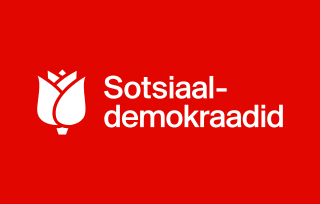
The Social Democratic Party is a centre-left political party in Estonia. It is currently led by Lauri Läänemets. The party was formerly known as the Moderate People's Party. The SDE has been a member of the Party of European Socialists since 16 May 2003 and was a member of the Socialist International from November 1990 to 2017. It is orientated towards the principles of social-democracy, and it supports Estonia's membership in the European Union. From April 2023, the party has been a junior coalition partner in the third Kallas government.
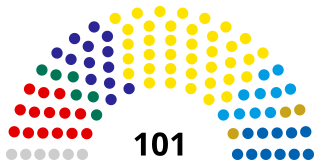
The Riigikogu is the unicameral parliament of Estonia. In addition to approving legislation, the Parliament appoints high officials, including the prime minister and chief justice of the Supreme Court, and elects the president. Among its other tasks, the Riigikogu also ratifies significant foreign treaties that impose military and proprietary obligations and bring about changes in law, as well as approves the budget presented by the government as law, and monitors the executive power.
Estonia elects a legislature on the national level. The Riigikogu has 101 members, elected for a four-year term by proportional representation. A head of state – the president – is elected for a five-year term by parliament or an electoral college. Locally, Estonia elects local government councils, which vary in size. Election law states the minimum size of a council depending on the size of municipality. Local government councils are elected by proportional representation too.
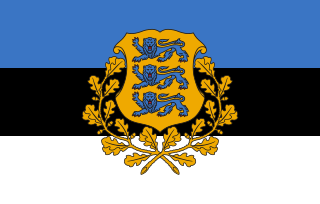
The president of the Republic of Estonia is the head of state of the Republic of Estonia. The current president is Alar Karis, elected by Parliament on 31 August 2021, replacing Kersti Kaljulaid.

The Government of the Republic of Estonia is the cabinet of Estonia. Under the Constitution, it exercises executive power pursuant to the Constitution and laws of Estonia.
Same-sex marriage has been legal in Estonia since 1 January 2024. The government elected in the March 2023 election, led by Prime Minister Kaja Kallas and consisting of the Reform Party, the Social Democrats and Estonia 200, vowed to legalize same-sex marriage. Legislation to open marriage to same-sex couples was introduced to the Riigikogu in May 2023, and was approved in a final reading by 55 votes to 34 on 20 June. It was signed into law by President Alar Karis on 27 June, and took effect on 1 January 2024. Estonia was the first Baltic state and the 20th country in Europe to legalise same-sex marriage.

Parliamentary elections were held in Estonia on 4 March 2007. The newly elected 101 members of the 11th Riigikogu assembled at Toompea Castle in Tallinn within ten days of the election. It was the world's first nationwide vote where part of the voting was carried out in the form of remote electronic voting via the internet.

Indrek Saar is an Estonian actor and politician. He has been the leader of the Social Democratic Party from 2019 to 2022 and the Minister of Culture of Estonia from 2015 to 2019.
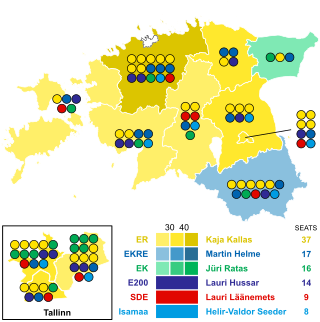
Parliamentary elections were held in Estonia on 5 March 2023 to elect all 101 members of the Riigikogu. The officially published election data indicate the victory of the Reform Party, which won 37 seats in total, while the Conservative People's Party of Estonia (EKRE) placed second with 17 seats. The Centre Party won 16 seats, a loss of 10, while Estonia 200 won 14 seats, gaining representation in the Riigikogu.

Kalle Laanet is Estonian politician and police officer. He is member of XIV Riigikogu. Since 2014 he belongs to Estonian Reform Party. He has served as Minister of Justice since 2023.

Electoral district no. 4 is one of the 12 multi-member electoral districts of the Riigikogu, the national legislature of Estonia. The district was established as electoral district no. 5 in 1992 when the Riigikogu was re-established following Estonia's independence from the Soviet Union. It was renamed electoral district no. 4 in 1995 following the re-organisation of electoral districts. It is conterminous with the counties of Harju and Rapla. The district currently elects 15 of the 101 members of the Riigikogu using the open party-list proportional representation electoral system. At the 2019 parliamentary election it had 133,437 registered electors.

Electoral district no. 6 is one of the 12 multi-member electoral districts of the Riigikogu, the national legislature of Estonia. The district was established in 2003 when the existing electoral district no. 6 was split into two. It is conterminous with the county of Lääne-Viru. The district currently elects five of the 101 members of the Riigikogu using the open party-list proportional representation electoral system. At the 2019 parliamentary election it had 44,583 registered electors.
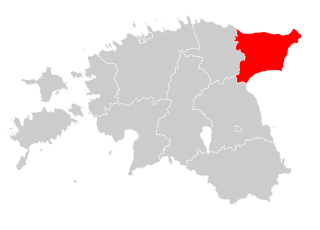
Electoral district no. 7 is one of the 12 multi-member electoral districts of the Riigikogu, the national legislature of Estonia. Established in 1992 when the Riigikogu was re-established following Estonia's independence from the Soviet Union, the district was abolished in 1995 following the re-organisation of electoral districts only to be re-established in 2003. It is conterminous with the county of Ida-Viru. The district currently elects seven of the 101 members of the Riigikogu using the open party-list proportional representation electoral system. At the 2019 parliamentary election it had 56,836 registered electors.
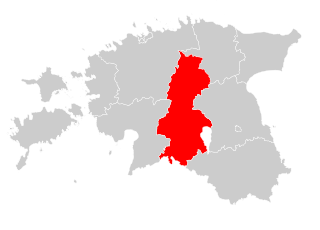
Electoral district no. 8 is one of the 12 multi-member electoral districts of the Riigikogu, the national legislature of Estonia. The district was established as electoral district no. 7 in 1995 following the re-organisation of electoral districts. It was renamed electoral district no. 8 in 2003 following another re-organisation of electoral districts. It is conterminous with the counties of Järva and Viljandi. The district currently elects seven of the 101 members of the Riigikogu using the open party-list proportional representation electoral system. At the 2019 parliamentary election it had 61,657 registered electors.

Electoral district no. 9 is one of the 12 multi-member electoral districts of the Riigikogu, the national legislature of Estonia. The district was established as electoral district no. 8 in 1995 following the re-organisation of electoral districts. It was renamed electoral district no. 9 in 2003 following another re-organisation of electoral districts. It is conterminous with the counties of Jõgeva and Tartu. The district currently elects seven of the 101 members of the Riigikogu using the open party-list proportional representation electoral system. At the 2019 parliamentary election it had 65,898 registered electors.
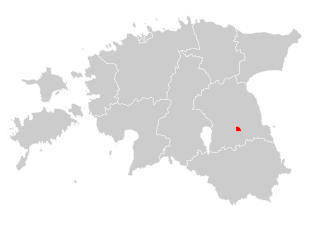
Electoral district no. 10 is one of the 12 multi-member electoral districts of the Riigikogu, the national legislature of Estonia. The district was established as electoral district no. 9 in 1995 following the re-organisation of electoral districts. It was renamed electoral district no. 10 in 2003 following another re-organisation of electoral districts. It is conterminous with the municipality of Tartu. The district currently elects eight of the 101 members of the Riigikogu using the open party-list proportional representation electoral system. At the 2019 parliamentary election it had 67,525 registered electors.

Electoral district no. 11 is one of the 12 multi-member electoral districts of the Riigikogu, the national legislature of Estonia. The district was established in 1992 when the Riigikogu was re-established following Estonia's independence from the Soviet Union. It was renamed electoral district no. 10 in 1995 following the re-organisation of electoral districts but reverted to electoral district no. 11 in 2003. It is conterminous with the counties of Põlva, Valga and Võru. The district currently elects eight of the 101 members of the Riigikogu using the open party-list proportional representation electoral system. At the 2019 parliamentary election it had 70,706 registered electors.

Electoral district no. 12 is one of the 12 multi-member electoral districts of the Riigikogu, the national legislature of Estonia. The district was established in 1992 when the Riigikogu was re-established following Estonia's independence from the Soviet Union. It was renamed electoral district no. 11 in 1995 following the re-organisation of electoral districts but reverted to electoral district no. 12 in 2003. It is conterminous with the county of Pärnu. The district currently elects seven of the 101 members of the Riigikogu using the open party-list proportional representation electoral system. At the 2019 parliamentary election it had 66,852 registered electors.

Alar Karis is an Estonian molecular geneticist, developmental biologist, civil servant and politician who, since 11 October 2021, has served as the sixth president of Estonia.